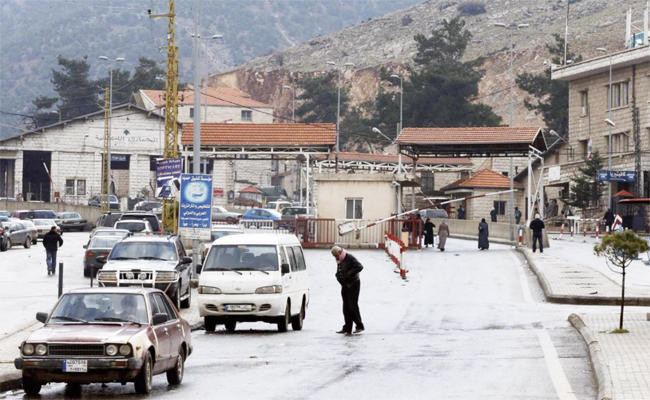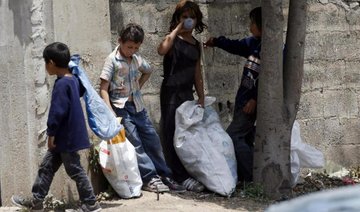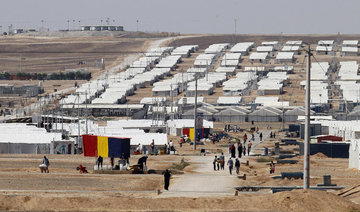DAMASCUS: Badr Honainy, a Syrian-Egyptian journalist based in Damascus, had spent days preparing for a job interview after being shortlisted for a sports editor job at the BBC.
But after waiting for hours at an official Syria-Lebanon border crossing, he was turned back without an explanation.
“This was a great opportunity for me,” said the disappointed 24-year-old.
As sanctions on Syria tighten, the only reprieve for its residents seems to be Lebanon. Attending embassy interviews, holding family reunions, sitting for international tests, joining training programs, and much more can only be done in Beirut.
However, with more than 1.5 million Syrian refugees flooding its borders since the civil war erupted in Syria in 2011, Lebanon has struggled to control the influx of refugees.
“I provided all the necessary documents and I have a journalist pass, an Egyptian passport, and a residency permit, yet I was treated badly by a few border officers and was not even given a chance to ask the smallest question,” said Honainy.
He was transferred to a security office but denied entry after waiting for hours.
“They refused to listen or provide me with alternative solutions,” he said.
“At the Masnaa Border Crossing, you notice that those who seem poverty-stricken are less likely to receive an entry permit because they seem very likely to stay in Lebanon as refugees,” according to a source who lives in Damascus and regularly visits Beirut.
People in fancy cars and elegant clothes are more likely to enter without complications, he said, “but sometimes even these are not lucky enough to enter in time for conducting their business.”
“Some 30 percent of the people in Lebanon at the moment are Syrian refugees, giving Lebanon one of the highest per capita refugee (populations) in the world,” Dr. David Romano, professor of Middle East politics at Missouri State University, told Arab News.
“Among Lebanese voters, who have lost patience with such a burden, restrictive policies toward the entry of Syrians seem like a popular option for the government.”
Some Lebanese officials also fear the entry of former Daesh fighters looking to escape Syria, he said.
“The casualties of this sort of Lebanese reaction, unfortunately, include average Syrians who only need to go to Lebanon for day trips to buy things and get things done that they cannot do in Syria, such as banking, getting visas and sitting for exams like the GRE (Graduate Record Examinations).”
Last month, Lebanese General Security announced plans to implement new controls to further restrict the entry of Syrians into Lebanese territory through the Masnaa Border Crossing, a land-based crossing linking the customs checkpoints of Masnaa in Lebanon and Jdeidat Yabous in Syria. The date on which the new restrictions take effect was not announced.
The new regulations classify Syrians’ entry into six categories, each requiring specific documents and are given a specific type of residence or entry permit.
Sami Jamal, 33, a Syrian living in Damascus who travels regularly to Lebanon, said: “The people of Syria are largely helping the Lebanese economy, be it through investments or tourism, yet Lebanon wouldn’t cease to seek creative ways to restrict our entry.”
Alia A, 31, travels to Beirut every two months to see her fiancé, who lives in the UAE.
For her tourist visa she needs to carry $1,000 and book a hotel room in Beirut in advance.
“Now I’ll have to carry $2,000 for the same trip and I don’t feel comfortable carrying all this cash,” she told Arab News.
“I cannot blame Lebanon,” Anas, 21, a computer engineering student at Damascus University, said. “Many of my friends who could not be exempted from the compulsory military service fled to Lebanon without plans. I cannot imagine how many people a country as small as Lebanon can accommodate.”
Armand Cucciniello III, a former American diplomat and adviser to the US military, told Arab News, said: “Lebanon is a frontline state in the war in Syria, so it’s natural that people are flocking to the border,”
“But the country is very small and lacks an effective government and resources—all the reasons that may be contributing to the pushback against more refugees.”
Cucciniello believes identity could also be at play here. “Most Syrians coming to Lebanon are reportedly Sunni, whereas the majority of Lebanon are Shiite or Christian,” he explained, “so any possible change in the country’s already troubled demographic could be a source of concern and recalcitrance on the part of border and immigration authorities.”
He pointed out that Lebanon took in hundreds of thousands of Palestinian “temporary” refugees after 1948, who eventually became militarized and played a role in the civil war that ravaged the country in the 1980s.
“The country does not have a positive collective memory, if you will, of refugees, which could be contributing to its reluctance to let in more,” he concluded.
Earlier this year, the head of the International Committee of the Red Cross (ICRC) in Lebanon, Christophe Martin, said “the majority of Syrian refugees in Lebanon want to return home.”
In 2017, the UN said that “the vast majority of the roughly one million Syrian refugees registered in Lebanon now find themselves impoverished and in debt, with levels of hardship increasing each year.”
“Lebanon lacks good infrastructure,” Cucciniello said, “and we’ve seen Syrian refugees set up camp over the years in areas where the local population, too, is struggling.”
Syrians stifled by Lebanon’s new entry restrictions
Syrians stifled by Lebanon’s new entry restrictions

Risk of genocide in Sudan ‘very high’: UN

- The fighting has killed tens of thousands and displaced 13 million, including 4 million who fled abroad, triggering what the UN has called the world’s worst humanitarian crisis
GENEVA: The risk of genocide in Sudan’s devastating civil war remains “very high,” amid ongoing ethnically motivated attacks by the paramilitary Rapid Support Forces, a top UN official warned Monday.
Since April 2023, Sudan has been torn apart by a power struggle between army chief Gen. Abdel Fattah Al-Burhan and RSF commander Gen. Mohammed Hamdan Dagalo.
The fighting has killed tens of thousands and displaced 13 million, including 4 million who fled abroad, triggering what the UN has called the world’s worst humanitarian crisis.
“Both parties have committed serious human rights violations,” said Virginia Gamba, a UN under-secretary-general and acting special adviser to UN chief Antonio Guterres on the prevention of genocide.
“Of specific concern to my mandate is the continued and targeted attacks against certain ethnic groups, particularly in the Darfur and Kordofan regions,” she told the UN Human Rights Council in Geneva.
She highlighted in particular that the RSF and allied armed militias “continue to conduct ethnically motivated attacks against the Zaghawa, Masalit and Fur groups.”
“The risk of genocide, war crimes, and crimes against humanity in Sudan remains very high,” Gamba warned.
EU finds ‘indications’ Israel is breaching key agreement with its actions in Gaza

BRUSSELS: The EU says there are indications that Israel’s actions in Gaza are violating human rights obligations in the agreement governing its ties with the EU, according to its findings seen by The Associated Press.
EU foreign policy chief Kaja Kallas presented the review to foreign ministers of the 27-member bloc in Brussels on Monday, leading at least one country to propose suspending the agreement openly.
“There are indications that Israel would be in breach of its human rights obligations under Article 2 of the EU-Israel Association Agreement,” according to the review by the EU’s diplomatic corps, the European External Action Service.
Suspending ties would require a unanimous decision, which is likely impossible to obtain from countries like Austria, Germany and Hungary that tend to back Israel.
Other actions — such as ending visa-free travel to Europe for Israelis, sanctioning Israeli settlers in the West Bank or halting academic partnerships — could be pushed if a “qualified majority” — 15 of the 27 nations representing at least 65 percent of the population of the EU — agree.
Countries like the Netherlands, Ireland, and Spain have been vocal in their support for the Palestinians in Gaza as Israel battles Hamas.
“When all the focus is on Iran and the escalation regarding Iran, we should not forget about Gaza,” said Dutch Foreign Minister Caspar Veldkamp, who led the charge for the review.
Israel launched its military campaign in Gaza after the Oct. 7, 2023, attack on southern Israel.
About 56,000 Palestinians have since been killed, according to Gaza’s Health Ministry, and relatively little aid has entered since Israel ended the latest ceasefire in March.
Outrage over Israel’s actions in Gaza has grown in Europe as images of suffering Palestinians have driven protests in London, Berlin, Brussels, Madrid, and Amsterdam.
Spain has canceled arms deals with Israel and called for an arms embargo.
Spanish Foreign Minister José Manuel Albares Bueno on Monday called for suspending the EU-Israel agreement.
“The time for words and declarations is behind. We had enough time,” he told the meeting. “And at the same time, Palestinians in Gaza have no more time to lose. Every day, babies, women, and men are being killed. This is the time for action.”
Manuel Albares also called for an embargo on EU countries selling weapons to Israel and for the widening of individual sanctions on anyone undermining the proposed two-state solution.
“Europe must show courage,” he told journalists.
Israeli raids deep inside southern Lebanon target Hezbollah’s tunnels

- Warplanes carry out surprise airstrikes
- According to Lebanese security source, no casualties reported
BEIRUT: Israel launched airstrikes on alleged weapons caches of the Iran-backed Hezbollah, and tunnels in southern Lebanon on Monday, soon after it had struck targets within Iran.
Israeli warplanes carried out the surprise strikes on the outskirts of several villages, and valleys and hills in the districts of Jezzine and Nabatieh, and all the way to the district of Sidon.
The Israeli military claimed that “air force warplanes raided Hezbollah military sites containing rocket launchers and missiles, as well as weapons depots in the area north of the Litani (River),” adding that “the presence of Hezbollah weapons and activities in this area constitute a flagrant violation of the understandings between Israel and Lebanon.”
According to a Lebanese security source, no casualties were reported in the raids that focused on the valley between Ansar and Al-Zarariyeh, the Kfar Melki valley, and the area between the towns of Azza, Kafrwa Zefta, and Deir Al-Zahrani, along with the outskirts of Al-Aishiyeh, Al-Mahmoudiya, Al-Dashmakiyeh, and Wadi Barghoz.
The source told Arab News: “These raids apparently targeted areas containing Hezbollah tunnels and previous gathering points, which had previously been targeted repeatedly.”
The source noted that “the Israeli army used concussion missiles in these new raids, the sound of which caused powerful explosions and ground shaking, and the echoes of the explosions reverberated throughout most of the southern regions.”
He added: “The reason for these raids now is (as) a warning message to Hezbollah not to consider any attempt to rehabilitate what has been completely destroyed.
“The Lebanese army has not yet entered these targeted areas north of the Litani River to confiscate their contents, as it is still confining its mission to searching for weapons and ammunition south of the Litani River.”
Lebanon’s President Joseph Aoun and the country’s Prime Minister Nawaf Salam have held a series of meetings in light of regional developments to help prevent Lebanon suffering any repercussions from the escalating Israeli-Iranian conflict and to keep Lebanon neutral.
Aoun said on Sunday: “Lebanon, its leadership, parties, and people, are aware today, more than ever, that it has paid a heavy price for the wars that have erupted on its soil and in the region. It is unwilling to pay more, and there is no national interest in doing so, especially since the cost of these wars has been and will be greater than it can bear.”
Salam has stressed the need to “prioritize the supreme national interest and maintain unity and national solidarity, which requires avoiding Lebanon’s involvement or being dragged in any way into the ongoing regional confrontation.”
Iranian combat drone crashes into restaurant in Jordan’s capital, Amman

- Jordanian army says the Shahed 101 device had an explosive warhead but it did not detonate on impact
- Residential buildings in Abu Nseir and Azraq were recently hit, and 27 intact drones with explosive payloads crashed in uninhabited parts of the country
LONDON: An Iranian Shahed 101 combat drone crashed into a building in the Umm Uthaina area of Jordan’s capital, Amman, on Monday.
Brig. Gen. Mustafa Hyari, a spokesperson for the Jordanian army, said the drone had an explosive warhead but did not detonate on impact when it hit the patio of a restaurant in Umm Uthaina. There were no injuries and military engineers dismantled the device.
Recently, two drones struck residential buildings in Abu Nseir and Azraq, he said, and 27 intact drones with explosive payloads crashed in uninhabited parts of the country. In addition, hundreds of drone and missile parts fell onto Jordanian territory, Hyari added, but did not cause significant damage or serious injuries. He urged Jordanians to seek shelter when sirens sound, the Jordan News Agency reported.
Tensions have been rising in the region since a conflict between Israel and Iran began on June 13, sparking fears of a full-scale war across the Middle East. The two countries have continued to exchange attacks since then, and the situation escalated on Sunday when the US carried out airstrikes on three Iranian nuclear sites.
Six Iranian missiles headed for Al-Udeid US base in Qatar intercepted

- Sirens sound in Manama, Bahrain interior ministry urges people to remain calm and head to nearest safe space
- Qatar condemns attack, calling it “flagrant violation” of sovereignty
- UAE “closely monitoring ongoing regional developments” and “continuously assessing the situation”
DOHA: Iran confirmed it launched missile attacks Monday on US military bases in Qatar and Iraq, retaliating for the American bombing of its nuclear sites and escalating tensions in the volatile region, state media said.
Iran launched six missiles toward Al-Udeid Air Base in Qatar, as the sound of several explosions were heard over Doha.
The announcement was made on state television as martial music played. A caption on the screen called it “a mighty and successful response by the armed forces of Iran to America’s aggression.”
Qatar said it “successfully intercepted” missiles targeting the US base, and added it reserved the right to respond directly and in accordance with international law following the strikes.
It said it condemned the attack, calling it a “flagrant violation” of its sovereignty.
“We express the State of Qatar’s strong condemnation of the attack on Al-Udeid Air Base by the Iranian Revolutionary Guard Corps, and consider it a flagrant violation of the State of Qatar’s sovereignty and airspace, as well as of international law,” foreign ministry spokesman Majed Al-Ansari said in a statement.
*** READ SAUDI ARABIA'S CONDEMNATION HERE ***
The Gulf nation had announced earlier Monday it had closed its air space temporarily to ensure the safety of residents and visitors. Also on Monday, the US embassy in Qatar had advised Americans to shelter in place, out of what it said was “an abundance of caution.”
The US confirmed its air base in Qatar was targeted by missile attack from Iran and said no casualties were reported
“The White House and the Department of Defense are aware of, and closely monitoring, potential threats to Al-Udeid Air Base in Qatar,” a senior White House official said.
Bahrain said sirens sounded in Manama with citizens and residents were urged to remain calm and head to nearest safe place, according to the Interior Ministry.
The interior ministry affirmed that these measures were part of Bahrain’s proactive efforts to safeguard public safety and ensure efficient emergency response.
Bahrain also suspended air traffic temporarily on Monday.
“The Civil Aviation Affairs of the Ministry of Transportation and Telecommunications announced the temporary suspension of air navigation in the skies of the Kingdom of Bahrain as a precautionary measure in light of recent regional developments,” said a statement carried by the official Bahrain News Agency.
Kuwait Airways, in a post on X, said departure flights had been suspended due to the regional developments.
EgyptAir also announced on Monday the suspension of flights to and from countries in the region following the attacks.
EgyptAir said in a statement: “Due to the events taking place in the region and the closure of airspace in a number of countries in the Arabian Gulf region, it has been decided to cancel EgyptAir flights from Cairo Airport to cities in the Arabian Gulf and vice versa until the situation in the region stabilizes.”
Kuwait's civil aviation body issued a statement, saying: “The country's airspace has been temporarily closed as a precautionary measure, starting today and until further notice. The decision comes within the framework of maintaining the highest levels of safety and security in light of regional developments.”
The UAE said it was closely monitoring the ongoing regional developments and was continuously assessing the situation, a government spokesperson said.
“This approach froms part of the UAE's interegrated national framework for emergency and crisis management, which prioritizses public safety and the continuity of operations across all sectors,” the spokesperson added.
UAE airspace had also been closed, according to flight path data and air traffic control audio cited by FlightRadar.





















